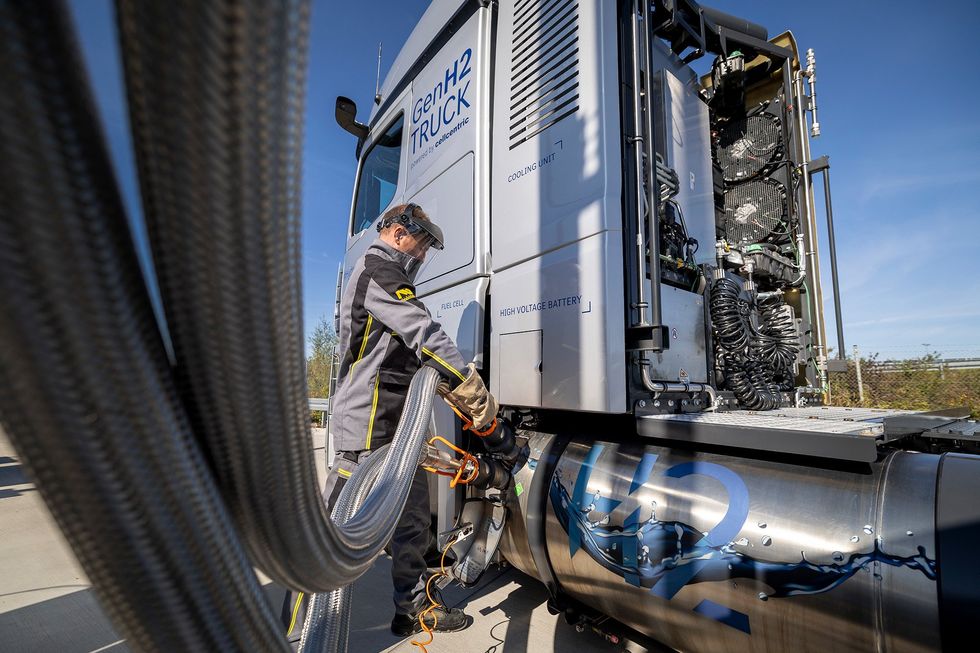Daimler Truck Fuels Big Rigs With Hydrogen

At CES this past week, the trucking startup Nikola showed off a hydrogen-fueled semi truck, one of its first ever built in the U.S. But the troubled company with a convicted founder is not the only player these days seeing a promising future in fuel-cell fueled big rigs. Daimler Truck has also recently announced their GenH2 electric semi. GenH2's motors draw power from a fuel cell that runs on liquid hydrogen, and Daimler has said the vehicle will appear on German roads by mid-2024.
The company has entered agreements with several companies that have fleet operations in the German region, where Daimler successfully tested a GenH2 prototype on a track and on public roads. Via these early road tests, the company says they've found that a fully loaded GenH2 proved capable of hauling its roughly 25-ton payload more than 1,000 kilometers on a single fueling.
Under the Hood of the GenH2 TruckThe fuel-cell system of the GenH2 Truck, according to the company, delivers 300 kilowatts. The truck also has a battery that can kick in an additional 400 kW in short bursts for quick acceleration and hill climbing. The battery's 70 kilowatt-hour storage capacity may seem small, bu seems it's sufficient for recycling kinetic energy that's converted to electric charge via regenerative braking.
 Daimler's GenH2 Truck, according to the company's initial road tests, can travel 1,000 km on a full tank of liquid hydrogen. Daimler Truck
Daimler's GenH2 Truck, according to the company's initial road tests, can travel 1,000 km on a full tank of liquid hydrogen. Daimler Truck
Daimler, along with Linde and Air Liquide, the German and French multinational suppliers of industrial gases and hydrogen refueling services, are taking advantage of advances in liquid hydrogen storage that yield notable advantages over using pressurized gas.
In its liquified state, more hydrogen can be carried per unit volume compared to room-temperature H2, which is a gas. As a result, energy density is significantly higher, while smaller tanks on the vehicle can still yield greater range than is possible than gaseous hydrogen. That space savings and boost in energy density let the truck haul a bigger payload.
At specially-equipped liquid hydrogen filling stations in Worth am Rhein and in the Duisburg area, cryogenic liquid hydrogen cooled to minus 253 degrees Celsius can be pumped into two 44-kilogram stainless steel tanks mounted on either side of a GenH2 semi's chassis. Refueling can be completed within 10 to 15 minutes. According to the company, high-efficiency insulation on the tanks keep the hydrogen below its ultra-low boiling point without active cooling.
We are also proud to be providing Daimler Truck with some of the necessary refueling infrastructure and hydrogen as part of the trials," says Caroline Stancell, General Manager (Europe and Africa region) of the Hydrogen for Mobility division at Air Products, a U.S.-based industrial gas supplier participating in the project. Our latest mobile fueling station for liquid hydrogen will be used for the project in the Duisburg area and can therefore operate under real conditions."
Daimler Truck's Next StepsAs it has done in the past with safety technologies it has spearheaded, Daimler has made the recipe for liquid hydrogen (LH2) publicly available. It is now an ISO standard. What's more, the automaker plans to work directly with other companies to help them develop their own liquid hydrogen refueling and fuel cell vehicle technologies. The aim, Daimler said in a press release, is to establish a global mass market for the new refueling process."
Daimler Truck is already at work with Linde on another new process for handling hydrogen cooled to the super low temperatures at which it takes the form of a liquid. The automaker says that process will yield even higher storage (and thus energy) density with easier refueling compared with the LH2 process.
Daimler is laying the groundwork for making hydrogen a more broadly available automotive energy modality. The company says it is also planning to work together with Shell, BP, and TotalEnergies to build out hydrogen refueling infrastructure for major transport routes in Europe.
Pricing details on the GenH2 Truck were unavailable at presstime. For comparison, Fleet Owner magazine estimates a Nikola fuel-cell semi costs approximately $750,000-although Fleet Owner adds that incentives from the U.S. Inflation Reduction Act and California HVIP grants could, for some owners, cut the cost back by $40,000 and $288,000, respectively.